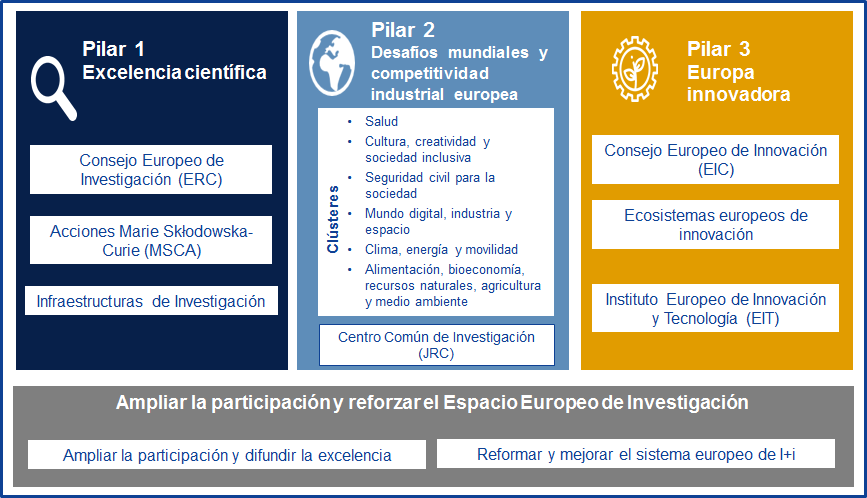HORIZON EUROPE
Horizon Europe is the European Union (EU) framework programme for research and innovation (R&I) for the period 2021-2027. The Horizon Europe Programme, like its predecessor Horizon 2020, will be the key instrument for implementing EU R&D&I policies. The overall objective of the programme is to achieve a scientific, technological, economic and societal impact of EU investments in R&I, thereby strengthening its scientific and technological bases and fostering the competitiveness of all Member States (MS).
With a budget of €95.517 billion for the seven-year period, Horizon Europe will be the Framework Programme with the largest budget to date, with the potential to generate significant economic, social and scientific benefits. It is estimated that Horizon Europe will generate 11 euros in Gross Domestic Product (GDP) gain for every euro invested, create up to 320,000 new highly skilled jobs by 2040 and consolidate Europe’s leadership in Research and Innovation. The Programme is designed with an investment mindset rather than as a purely funding instrument, and will be planned to help the EU make the transition to a prosperous and sustainable future.
The Horizon Europe Programme has a three-pillar structure:

Pillar 1, Excellent Science, which through the European Research Council (ERC) will fund investigator-driven and investigator-led frontier research projects. It will also support the career development and training of research staff, through the international and intersectoral mobility activities of the Marie Sklodowska-Curie (MSCA) programme and invest in improving and optimising transnational access to world-class research infrastructures.
Pillar 2, Global Challenges and European Industrial Competitiveness, will fund research into societal challenges, strengthen industrial technological capabilities and establish ambitious mission objectives targeting major global challenges (health, climate change, renewable energies, mobility, security, digital, materials, etc.). In addition, it will support the creation of European partnerships (or European partnerships) with Member States and industry to work together on R&D&I. It will also include the Joint Research Centre (JRC) which will assist EU and national governments in their decision-making by providing scientific evidence and technical support.
Pillar 3, Innovative Europe, aims to make Europe a pioneering powerhouse in market-creating innovation and growing innovative SMEs through the European Innovation Council (EIC). It will support leading innovators, entrepreneurs, SMEs and scientists with ambitions to grow internationally. In addition, the European Institute of Innovation and Technology (EIT) will continue to foster the integration of research, higher education and entrepreneurship through the Knowledge and Innovation Communities (KICs).
These three pillars will be underpinned by a horizontal programme, Widening Participation and Strengthening the European Research Area (ERA), dedicated to helping EU MS in their efforts to develop their national research and innovation potential, and especially those states with lower R&I performance to improve their participation in Horizon Europe.

